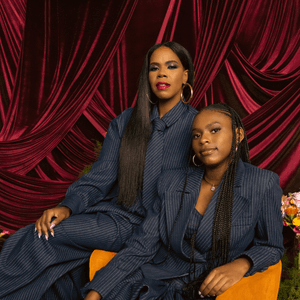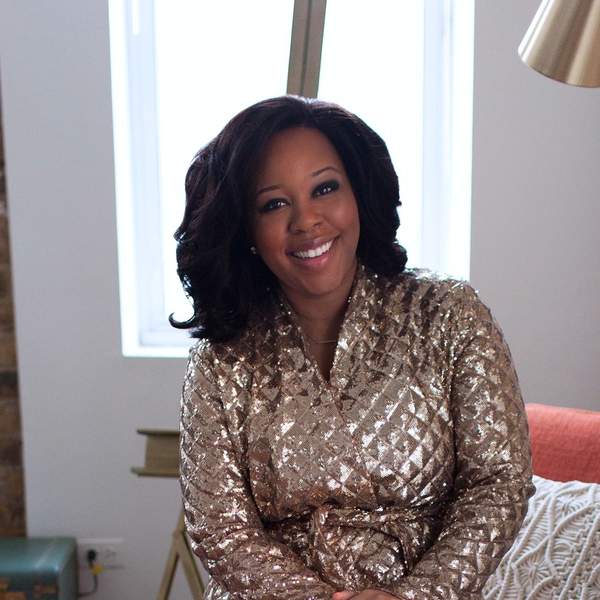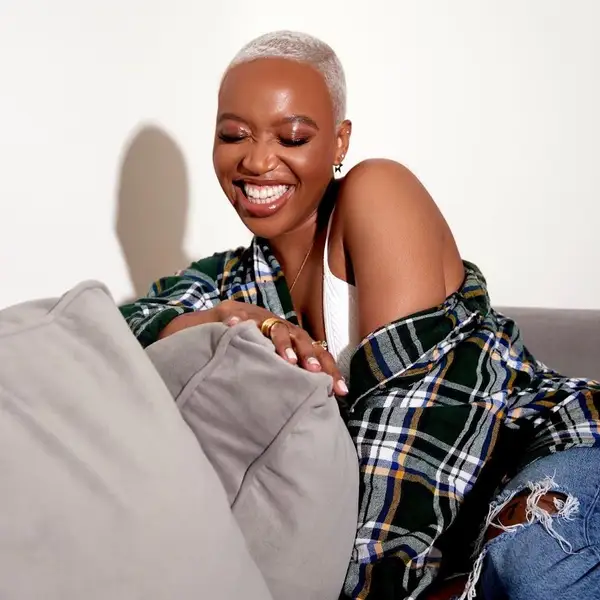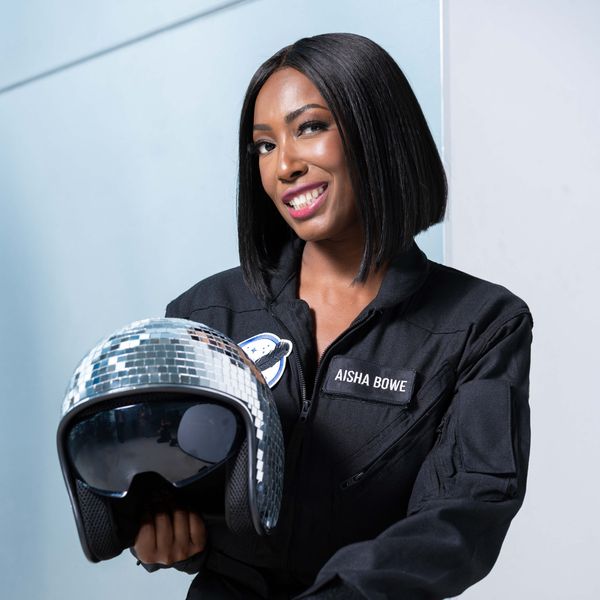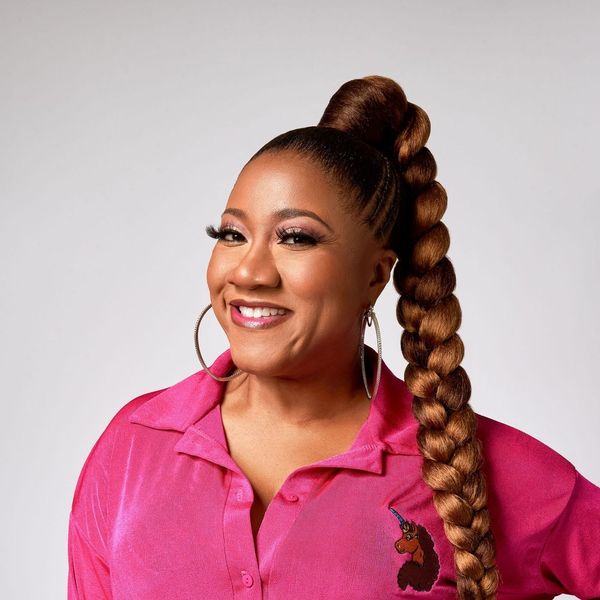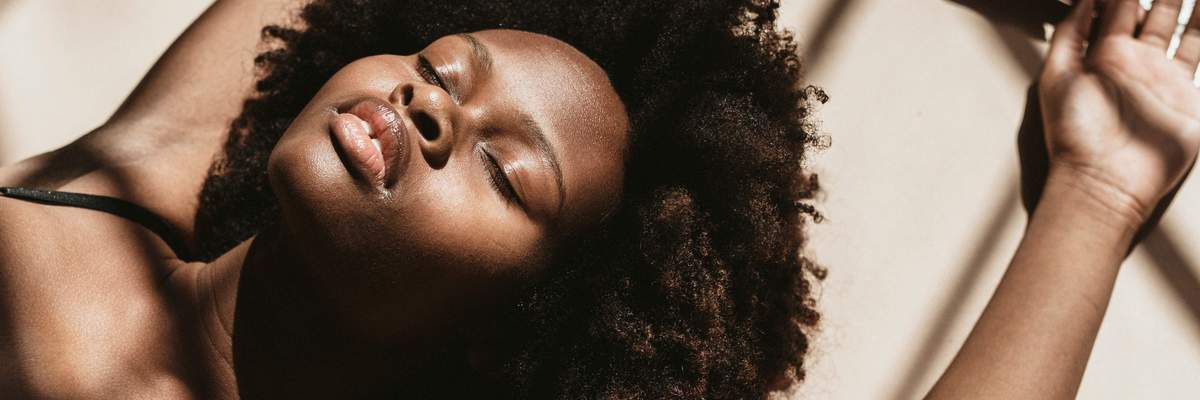Despite being identified as the fastest-growing group of entrepreneurs in the United States, Black women still lack representation in one of the fastest growing and influential sectors of society - technology. One 2018 Kapor Center study reports that Black women account for less than 0.5% of Silicon Valley tech leadership positions and less than 4% of female-led tech startups. How can Black women confidently hold positions in the technology world, use their power as a catalyst to empower communities and fuel the next generation of innovation?
Chicago-based marketing consultant and app entrepreneur Amanda Spann is on a mission to change that narrative.
She's a fierce advocate for helping people of color make their mark in the tech industry - a space that we often count ourselves out of. Through her work, she helps build and brand startups while also helping aspiring and emerging founders bring their technology-focused ideas to life. Her company, Happii, currently consists of three different business verticals: apps, entrepreneurship-focused digital products and ebooks, and consulting services for startups and enterprises. Her new podcast, The Minimal Viable Podcast, provides Blacks founders a platform to talk candidly about their experiences in tech. She also hopes it will be a safe space for listeners to learn about the intersection of technology and entrepreneurship.
xoNecole spoke with Amanda about her journey, challenges many tech entrepreneurs face, tips for thriving as a new entrepreneur, why we need more Black women in tech, and the bigger impact funding technological innovation will have on our communities.
Check out the interview below!
How did you become interested in technology?
I've been in the space for about ten years now. I've always been interested in technology since I was a teenager, but I think there was some apprehension about being involved in the space because I felt like I couldn't be a part of it unless I was coding. As someone who has a nontechnical background, that was an initial barrier of entry for me. I could have gotten into the space a little earlier if I didn't have those insecurities about my skill-set and impostor syndrome looming over my head. The more I learned and researched about the space, I realized there were capacities and opportunities for everyone. There are opportunities to create your own role within the tech space or fill a lot of necessary roles at existing companies.
How did working in public relations help you as an entrepreneur?
Publicists organically are great founders. You tend to have to wear a lot of hats. You become your client's manager, therapist and confidant, in addition to becoming their friend. Likewise when you're running a tech startup or a company, there is always something to do. You can't be hands off with any part of the company even if that is not your sole responsibility. You have to be agile and fluid about your roles and capacity. You have to be able to move in a lot of directions. Being able to learn how to be flexible and malleable to learn from every mistake really set me up to be a startup entrepreneur in the future.
"When you're running a tech startup or a company, there is always something to do. You can't be hands off with any part of the company even if that is not your sole responsibility. You have to be agile and fluid about your roles and capacity."
Why did you decide to become an entrepreneur?
I always had side hustles. At some point, it became faith versus fear for me. I realized as I kept entering back into the corporate space, I wasn't as happy or fulfilled. I felt like I was never going to be able to give as much to these companies as I would my own. It had been tugging on my heart strings and mind for a really long time. It started to feel debilitating that I was haunted by my ideas. At some point, I had to make a choice whether I was going to stink or swim. A big part of that was taking the leap and not looking back. I felt like I was never going to get my products to where I wanted to be if I didn't dedicate myself to it full-time. It's been one of the most difficult yet rewarding experiences of my life.
What's the biggest challenge most entrepreneurs face when starting?
Money. Between running the company and business development, you're getting pulled in a lot of directions. It's hard to work on your business when you're working in it. You have to learn the discipline to balance and allocate time for both.
One thing that I encourage entrepreneurs to do is to start small and scale up. I just had a friend who wanted to open a restaurant. I suggested to start with selling just sauces. That might provide you with the capital to open a brick and mortar business. You don't want to assume too much risk so soon. There's not that much risk associated with buying the time you need at an open kitchen and buying the supplies you need to make the sauce. The returns are good. You can build up the capital as opposed to taking out a loan.
I don't want to discourage people from dreaming big. Keep your long-term dream in mind, but there are a lot of different paths to get there. It doesn't always start with the biggest iteration. You never know where it might take you. You may find yourself on another path.
What are the critical keys to successfully scaling a business?
What we try to encourage most founders in tech when they are building their product is to build a minimal viable product (MVP). This is the leanest, simplest version of your product possible. How do I build the simplest version of this product, get it out to the world and learn as much as I can about my consumers so I can make it better and make more money in the process? You're not going to know everything. You do yourself a disservice if you give all the bells and whistles upfront. What's in your head isn't necessarily a guarantee that people might like it. You eat up a lot of your money by adding features that [are not] always critical at the time of launch.
If you are not embarrassed by the first version of your product, then you did too much or you did it wrong. You're not going to catch everything. You are going to make mistakes and be embarrassed. That's part of the process. You can always improve the product. Take the leap and start. Don't be embarrassed to admit what you don't know. You have to learn to be patient with yourself and know that everything will come in time. Don't beat yourself up every step of the way about getting it perfect because it never will be. It's more important to start, keep going, build, and iterate as you go.
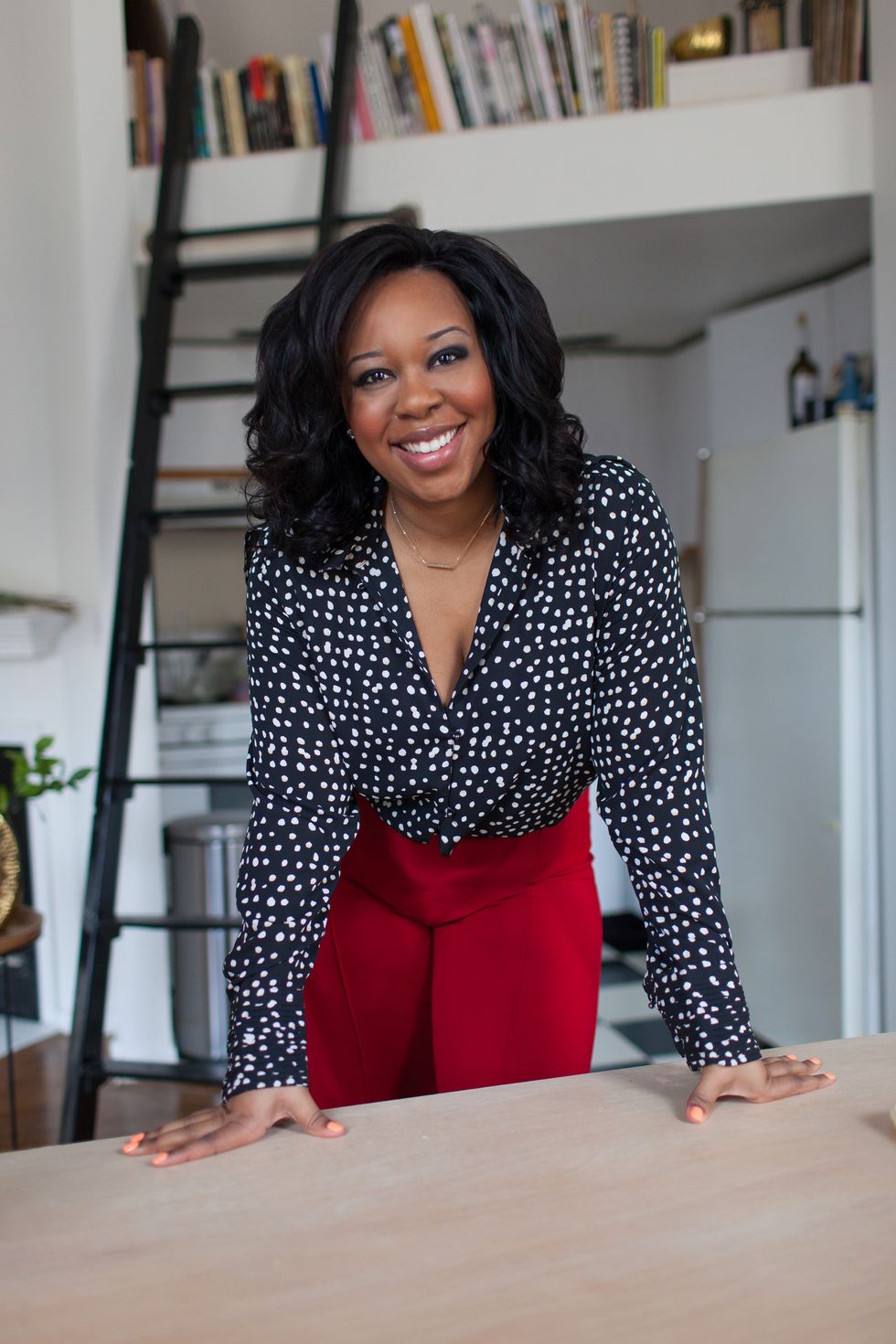
Courtesy of Amanda Spann
What are some of your favorite business resources for tech entrepreneurs?
Use Google! Everything that you're looking for is figure-out-able. You'll be surprised at how many people ask questions and don't take the time to plug it in and search. If you're going to go into tech, Building A Startup is a really helpful book about the process of building a MVP.
User acquisition is a big challenge for tech entrepreneurs. What's your go-to marketing tip for getting customers to know about one's product?
The biggest thing is understanding who your target audience is and narrowing that down. There are a lot of people who build a product and say it's for Black people. Which Black people? Elderly? Millennial moms? Generation Z? Define and hone in on the demographics and psychographics of your target audience, what motivates them to purchase further, where they are living online (and offline), what they are reading and how they get their information. Not enough entrepreneurs are doing the due diligence to figure out who they are really targeting.
How do you get into the tech industry as a non-technical founder?
You have to swallow your fears. Know that you're going to have to operate through fear. Broaden your idea of what it means to be a tech entrepreneur or someone who works in the tech space.There are plenty of opportunities in several roles. Tech companies are businesses just like any other company. They need operations, business management, accounting, etc. A lot of us have those skill-sets. We just need to figure out how to transfer them over to the space.
Open yourself up to networking. A lot of times people are getting these roles because they know the right people or the right people know them. It's easy for us to pull ourselves off solely into Black spaces - which I encourage to some degree. In order to step into this new space, you're going to have to step into new territories you've never gone before. That may make you uncomfortable but you are more confident and capable of being there than you know. People need your skills, ideas, and perspective. They'll never get it if you never take that leap into entering the space.
"You have to swallow your fears. Know that you're going to have to operate through fear... That may make you uncomfortable but you are more confident and capable of being there than you know. People need your skills, ideas, and perspective."
What tech industries are in desperate need of Black voices?
All of them! The cannabis industry needs a lot of ancillary professionals - people who aren't necessarily growing or distributing the products. They need people who are helping them streamline their operational practices...there's a huge opportunity there. Gaming and e-sports is wide open for Black women. Artificial intelligence, augmented reality...there's a great opportunity to learn more about that. Any tech industry overlaps with everything we already do. Use the skills you have currently and figure out how you can apply those and add value to existing tech companies and where they are going. Your expertise is valued and wanted but we have to figure out better ways of making a bridge for ourselves.
People always ask me about how racist the tech industry is. It's definitely racist but it's not always a willful racism. [Tech folks] are consumed with themselves and what they are building. When they need someone to fill a role, they reach out to their network. If you are only in the tech space and don't step outside to other industries and spaces, you will only get people who are like-minded or like you - even if what you ultimately need is outside of that. That cycle happens again and again. Because they have so much money and resources, it isn't always second nature to step outside. As the landscape of this country changes and we become more involved in the tech space, there will be an even greater demand and it will require white entrepreneurs and executives to look outside their spaces and be proactive and thoughtful about seeking out Black and Brown talent.
What are the biggest challenges that women of color in tech encounter?
We often pursue ideas that we believe should exist, but we don't necessarily think of them in terms of businesses. I see a lot of Black women creating service-oriented businesses or a product that is difficult to scale. We have to think about our ideas in terms of how we can monetize them and not just in terms of bringing them to life. We need to think of a business in terms of "How can I build or provide something that is so valuable and solves such a big problem that they will actually pay for it?"
[The reason] why you don't see as any Black women tech entrepreneurs is not because we're not entrepreneurs, it's because we're entrepreneurs in other spaces. So many women are starting skincare, haircare, cleaning, or event planning services. I think it's cultural to some degree. We're passionate and generous givers and tend to be more service-oriented. We've oftentimes put ourselves in position to be the mules of our family and community. We need to be mindful of that in terms of our own self-care and well-being.
This is not to say these can't be tech businesses. We don't think about how we can infuse tech to scale our business, get it to more people and make it more affordable and accessible to people so they can buy and we can make money while we sleep.
More Black women need to be afforded educational opportunities and information on what they can do with technology. It's not even about thinking of yourself as a tech founder, it's about leveraging what is out there to make your business better. A lot of people call me a techie - but I don't call myself one. I solve problems out in the world by way of technology.
What are "innovation deserts" and how do they impact our communities?
If you go into a lot of Black neighborhoods around the country, you will notice a lack of (or limited) type of commerce. I live on the south side of Chicago. We have coffee shops, but when you go across town, you're seeing wi-fi cafes and places where people can build and create - places where people have access to computers and information. As a result of lack of access to information, technology, and innovation - we are falling behind in a lot of industries and falling behind financially. The lack of information is costing us money. There is a Black tax for a lack of information, financial resources and access. Poverty costs.
When people don't have access to information or innovation, our communities stay behind. Other communities are being built up, progressing and attracting new residents, commerce, and jobs. In our communities, all you have is chicken shacks and liquor stores on every corner. [We] deserve more than that. It's important that we support entrepreneurs who want to bring businesses into our communities. Advocate amongst our Congress people and representatives to bring innovation centers to our schools and buildings in our community so that our youth and adult population are better educated on how they can create new jobs and further communities for themselves.
"As a result of lack of access to information, technology, and innovation - we are falling behind in a lot of industries and falling behind financially. The lack of information is costing us money. There is a Black tax for a lack of information, financial resources and access. Poverty costs."
Will creating more innovation centers change the landscape for Black entrepreneurs?
There will be a dynamic shift in our economic and mental empowerment. We are already an amazingly resilient and dynamic people. We have survived and created so much with nothing. Imagine what we could do if we were provided access. Imagine how the landscape of our communities might change if the three most savvy entrepreneurs you know are now afforded money and access to capital. Now those people are economically empowered, secured, can pour into their kids and relatives and create new opportunities for the next generation.
Who are some of your favorite Black woman tech crushes?
I have a soft spot for Myleik Teele being that she was a publicist and is now running a tech-enabled business. I see a lot of parallels in my life with hers. As far as women in the tech space, [I admire] Felicia Hatcher who does so much to ensure that we are included in the conversation and are disrupting innovation deserts around the country. My former business partner Sheena Allen is the youngest Black woman in the country who owns an online bank.
Megan Holston- Alexander is a Black woman venture capitalist who is making sure we have representation out there in Silicon Valley. There are a lot of dynamic woman in the startup scene who are rising quietly and building. It's an exciting time for all of us. Over the next five years, you will see an increase in women taking the reins of their financial and economic future and as tech entrepreneurs.
To learn more about Amanda, her products, consultations, and podcast, visit www.amandaspann.com.
- Episode 48 - Amanda Spann - POCIT. Telling the stories and ... ›
- 5 Young Black Leaders in Technology ›
- Amanda Spann's MVP on Apple Podcasts ›
- 10 Unique Black Women-Owned Tech Startups ›
- Alchomy: Black Female Tech Developers Create Drinking Mobile App ›
- Meet The Founders Of The New Mobile Drinking App Alchomy ... ›
- Amanda Spann | Los Angeles Sentinel | Black News ›
- Amanda Spann - Mentor - 1871 | LinkedIn ›
- Astin Hayes and Amanda Spann relaunch TipOff game for Black ... ›
- This Black Woman Is Opening The Door For People of Color In Tech ... ›


